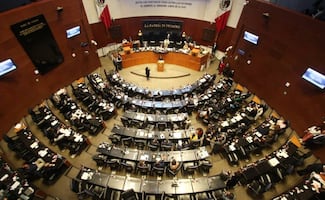Más Información

Jessica revive la nostalgia de la SEP en “Pancito Merge”; así se inspiró la ilustradora en el videojuego mexicano de Nintendo Switch

"El Mencho" tenía presentes a Los Alegres del Barranco; en cartas le hablaban del grupo musical que cantaba su corrido

Publican en el DOF decreto que reduce la jornada laboral a 40 horas; así aplicará la disminución año por año hasta 2030

Senado recibe iniciativa para acortar altas pensiones de exfuncionarios de CFE y Pemex; prevé ahorro de hasta 5 mil mdp anuales
Ready to win a spot for the literature of their people and rescue the richness of their language, eight Mexican poets and narrators will talk this weekend at the 2nd Annual Indigenous Literature Conferenc e in Los Angeles, United States.
“Due to our need to adapt, the first thing we (indigenous immigrants) lose is our native tongue, and with it, our most important values. It's necessary to acknowledge the importance of our language and the need to preserve it,” said Pergentino José Ruiz, Zapotec poet and narrator from Sierra del Sur.
Beyond disseminating their indigenous literature and their works, these eight authors pretend to raise awareness in the immigrant communities about the importance of preserving their language, oral tradition, and the relevance of writing down these stories.
As a teacher and defendant of the Zapotec language, José Ruiz (José is his last name) has seen up close how prone Mexican indigenous people are to forget their mother tongue and neglect sharing this inheritance with the newer generations.
“Even when they migrate within the state of Oaxaca, four hours away from their community, they don't want to speak Zapotec anymore because Spanish is the predominant language and they don't want to be discriminated,” he says.
The greatest fear of the authors is that immigrants arriving in the US decide to permanently forget their language. At least 67 indigenous languages are spoken in Mexico, and the number of immigrants from these communities in the United States keeps rising, particularly within "The Golden State”.
According to data from the Census of 2010, California is the home of at least 200 thousand Mexican indigenous immigrants.
“Giving a voice to the indigenous communities is a powerful and important thing because indigenous immigrants don't forget [their language] because they want to,they do it to survive,” claims José Ruiz, author of the poetry collection Lenguaje de Pájaros (Language of Birds), which is written in Zapotec and has been translated into Spanish and English.
This is the second time the Public Library of Los Angeles hold this conference, organized by the Binational Front of Indigenous (FIOB, in Spanish) and Zapotec organizations in Los Angeles CIELO and CHEBÁN.
Last year, the initiative was very well received, even between Mexicans who don't descend directly from indigenous communities.
“There were people who asked me for the book in Spanish. It would be their first book in this language, and at least they would know someone's talking about the Zapotec [language],” said Pergentino José Ruiz, author of the book Y supe qué responde r (And I knew What to Answer), the story of a Zapotec boy who dreams his teachers are asking him questions in Spanish.
One of the main participants in this encounter is the Zapotec writer and poet Filemón Beltrán Morales, who has been working for 35 years to achieve the recognition of the vastness of his language.
“Our culture relies heavily on oral tradition, so we need to put it on paper. It's our literature,” claims the author the Traditional Medicine in the Zapotec Community of Zoogocho, Oaxaca .
In his proposal, the Oaxaca native aims for all the attendants of the conference, even if they are unfamiliar with the Zapotec, to take the time to listen to his written poems in this language, so they can feel them and interpret them.
“In Zapotec, the verb comes first, because the action is the reflection of what we are, and it's a powerful experience to be able to understand this concept,” he says.
For Hubert Matiuwaa, Me'phaa writer (Tlapanec from Guerrero), immigration is closely linked to literature and to the act of writing itself.
The author claims it was the first time when he left his community to study, that he felt the need to write down the stories which reminded him of who he was and where he came from. “I began to tell the stories my grandmother, my mother and my father used to tell me so I wouldn't forget them,” he said.
At this conference, the poet Natalia Toledo, author of Paraíso de Fisuras (1992) (Paradise of Ruptures), will also be present.
The writer, who was born in 1968 in Juchitlán (Oaxaca), claims it's vital to keep fighting to preserve and promote indigenous literature .
Other participants are the Mixtec poet Celerina Patricia Sánchez, Mazatec poet Juan Gregorio Regino, poet and author afro-indigenous Alan Peláez López and Zapotec author Lamberto Roque Hernández, who will join multi-lingual rappers Miguel Villegas (Una Isu), Pat Boy and Yazmin.
am
Noticias según tus intereses
[Publicidad]
[Publicidad]










